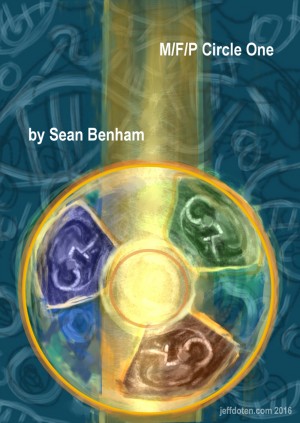Interview with Sean Benham
Published 2016-06-09.
Congratulations on your story M/F/P Circle One being part of the Collidor project, which is published by Reality Skimming Press. What was your inspiration for the story?
I wish this story had an exciting Genesis, but to the best of my recollection the idea of writing about the creation of a third sex just came to me one night while I was out walking my dog. It seemed like a good angle for an overreaching bureaucracy story, so I ran with it.
What made you think of a third sex as an intermediary between male and female?
I wanted to keep the third sex as a reproductive necessity, as opposed to a pleasure and desire-based ‘flight of fancy’ creation. The pollinators had to be humanity’s Hail Mary pass, a last ditch attempt to try and maintain some kind of baby-making normalcy - even though it was clear that things could never be the same as they once were. They’re a selfish creation, a poorly treated subset. Their self-identification and sexual preference take a definite backseat to their service to ‘regular’ men and women.
The actual pregnancy is very short in your story. Is it accelerated due to changed DNA?
Something along those lines, yes. The pollinators have been set up to expedite the birthing process in addition to keeping it safe and sterile. So, in their creation, they were made to pump babies out with, frankly, terrifying speed. Plus, a waiting period of nine months didn’t really jive with the story I wanted to tell.
There is talk about fairness as each couple dreams of what they don’t have and wants to break out of a complacent society. Are you warning us of things to come?
No, I think this tale is a bit too far-fetched to serve as a warning, at least on a macro level. There are certainly some parallels that can be drawn between the world we live in today and the world depicted in my short, but, as restrictive and unfair as our present-day reality is to many people, the real-life restrictions and stigmas are nowhere near those detailed in the story. That said, I suppose on a personal level it’s a cautionary tale of sorts. Self loathing coupled with rash decisions and a desire to ‘have it all’ is probably a bad mix regardless of the circumstances.
Authors or otherwise, who (or what) would you call your biggest influences as a writer?
As a general rule, I try to avoid patterning my work after anyone else’s. I like the short stories of Roald Dahl and Kurt Vonnegut though, so let’s go with those two.
Reality Skimming Press brands itself as 'optimistic SF.' Tell us what this phrase means to you.
It’s a phrase that’s actually at odds with what I tend to write, at least at first glance. There’s no story without conflict, and in my eyes, ‘optimism’ goes hand in hand with peace, happiness and an overall lack of conflict. No news is good news, and all that. I tend to lean heavily towards darker themes when world building, but try to keep characters and character interaction relatively light and fun. I guess that was a long-winded way of saying “To me, Optimistic SF means characters making the best of a bad situation.”
What projects are you currently working on?
I’m getting closer and closer to wrapping my second novel, Bastard Son. It picks up right where my first novel, White American leaves off... But, that doesn’t mean much to anyone out there since this interview will be published a few days before White American’s release! It’s funny how timing can work out sometimes. Hopefully M/F/P Circle One whets a few appetites for my longer work.
On top of that, I’ve got a bundle of short stories in various stages of completion. My aim is to release them all as an anthology sooner rather than later.
Smashwords Interviews are created by the profiled author or publisher.
Books by This Author
M/F/P Circle One
by Sean Benham
After a powerful STD turns sexual activity into a certain death sentence, humanity creates a third sex to combat the reproductive crisis, inadvertently creating an outcast sexual underclass in the process. Two couples on opposite sides of the schism between tradition and necessity struggle to have a child in a world where no one is making babies the old-fashioned way.

